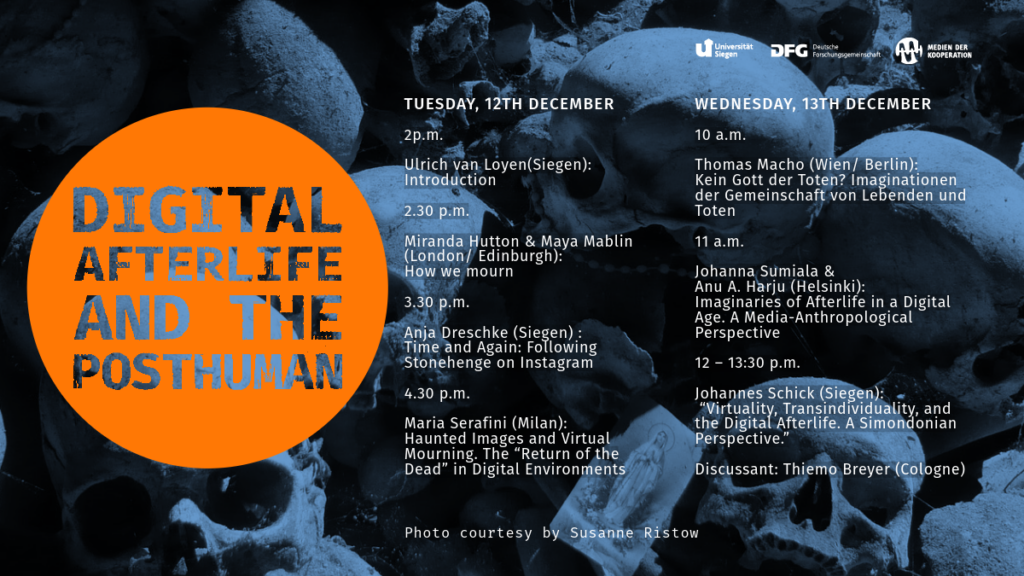Workshop „Digital Afterlife and the Posthuman“
Siegen, 12th – 13th of December 2023
Organized by the Chair of Media Theory and the CRC 1187 “Media of Cooperation”
Herrengarten 3, third floor Rooms AH-A 228 (Tuesday) and AH-A 217/218 (Wednesday)
Meeting-Link:
https://uni-siegen.webex.com/uni-siegen/j.php?MTID=m5d1cad4ceb77c726b4bef592364a6824

1.
Rites of passage which contain dying and death or dissolve what Freud has called “the ambivalence of feelings toward the dead”, have been investigated by anthropologists for ages. However, it is only quite recently that we pay attention to the long farewell in the Internet – although the first virtual tomb stone was already set in 1993. Research on digital mourning quite often has to deal with the virtuality of survival, with accounts and footprints left in the Social Networks which can hardly be cancelled (Sisto 2018). The entire space of the Social networks seems to abound from ghosts and spirits, similar to the one which is increasingly occupied by Artificial Intelligence: by Chatbots for instance which are equipped with memoirs, argumentation strategies and even the voice of the person who in lifetime has decided to talk to us from beyond the grave (Mason-Robbie & Savin Baden 2020). It is at this very point that the questions of “virtual death” and of the Posthuman intersect (Stokes 2021).
2.
The intention of our workshop in Siegen is thus twofold: we want to know which are contemporary forms of mourning, how digital techniques (smartphone photography e.g.) change the way we see death, how the ‘Farewell’ and its ‘rite de passage’ in the www are organized, by which medias and devices, how the respective media artefacts do enter the virtual space, what is their effect in the offline-world, and which are the social groups one could consider as the avantgarde of “virtual mourning”?
Furthermore, we would like to go on asking what follows from these practices for the conception of the human itself. The extensions of the Self in space and time, its multiple ways to instantiate itself and the possibility of merging with (virtual) others could also open up spaces to re-think the divide made between Westerners and ‘indigenous’ people and could invite us to reconceptualize ideas of personhood ascribed to the cultural other in the past (analogous to Marcel Mauss’ classical reconstruction of “personhood”, 1938).
3.
The first section of the workshop shall be dedicated to projects in the realm of (secular) mourning and grieving, to practices of digital commemoration, the circulation of images etc. The second part should deal with the digital practices of Farewell, with funeral rituals and the Internet, or with digital heritage. The third section will rather raise treat conceptual questions as mentioned above.
Literature
Mason-Robbie V., & Savin-Baden M. (2020). Digital Afterlife: Death Matters in a Digital Age. CRC Press.
Sisto D. (2018). La morte si fa social. Bollati Boringhieri, Turin.
Stokes P. (2021). Digital Souls: A Philosophy of Online Death. Bloomsbury.
Participants
Thiemo Breyer, philosopher, phenomenologist, Cologne
Anja Dreschke, Filmmaker, photographer and anthropologist, Siegen
Anu A. Harju, Social sciences, PI of the research group: “Digital Death”, Helsinki
Miranda Hutton, photographer and anthropologist
Ulrich van Loyen, Media Studies, Siegen
Maya Mablin, anthropologist with great expertise in the field of Global Christianity, Edinburgh
Thomas Macho, philosopher, Director of the International Research Center for Cultural Studies, Vienna
Johannes Schick, philosopher, with special expertise in the field of philosophy of technology
Maria Serafini, philosopher, Milano
Johanna M. Sumiala, media studies, principal investigator of the Research Group: “Digital Death: Transforming history, rituals, and afterlife” (https://www.helsinki.fi/en/researchgroups/digital-death-transforming-history-rituals-and-afterlife/people) Helsinki
Program
Tuesday, 12th December – AH-A 228
2p.m.
Ulrich van Loyen (Siegen): Introduction
2.30 p.m.
Miranda Hutton & Maya Mablin (London/ Edinburgh): How we mourn
3.30 p.m.
Anja Dreschke (Siegen) : Time and Again: Following Stonehenge on Instagram
4.30 p.m.
Maria Serafini (Milan): Haunted Images and Virtual Mourning. The “Return of the Dead” in Digital Environments
Wednesday, 13th December – AH-A 217/218
10 a.m.
Thomas Macho (Wien/ Berlin): Kein Gott der Toten? Imaginationen der Gemeinschaft von Lebenden und Toten
11 a.m.
Johanna Sumiala & Anu A. Harju (Helsinki): Imaginaries of Afterlife in a Digital Age. A Media-Anthropological Perspective
12 – 13:30 p.m.
Johannes Schick (Siegen): “Virtuality, Transindividuality, and the Digital Afterlife. A Simondonian Perspective.”
Discussant: Thiemo Breyer (Cologne)
Contact
Dr. Dr. Ulrich van Loyen
ulrich.vanloyen[æt]uni-siegen.de
Back to calendar


